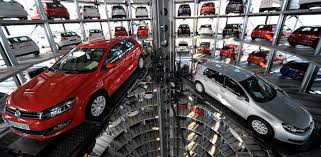Germany’s defense industry is on the rise, and companies like Renk are shifting gears fast, turning to a surprising partner for help: the auto sector. As geopolitical tensions rise and defense budgets grow, Germany’s automotive industry in defense is becoming a major trend.
Renk, a global leader in building gearboxes for tanks, is tapping into the pool of engineers and professionals from the car manufacturing world to keep up with booming demand. The company’s share price has surged over 300% this year alone, and orders jumped 164% in the first quarter, reaching €549 million (about $622 million).
Why Germany’s Automotive Industry in Defense is Growing
The shift comes as Germany, along with the wider European Union, boosts defense spending following the war in Ukraine and uncertain transatlantic ties. A historic fiscal package passed earlier this year gave a green light to major investments in military capabilities.
For Renk and other defense firms like Hensoldt and Rheinmetall, that means one thing: growth. But to meet demand, they need skilled workers — and that’s where Germany’s automotive industry in defense plays a key role.
Auto Engineers Powering the Next Generation of Tanks
Renk’s top leaders, CEO Alexander Sagel and COO Emmerich Schiller, both have roots in the automotive world — with past roles at Daimler and Mercedes-AMG. Their familiarity with automotive production methods is helping the company bring in experts from that field.
In an interview from Renk’s headquarters in Augsburg, Sagel said the firm is seeing many applicants from the car sector and is “of course” benefitting from their expertise.
Schiller added, “We’re really looking for engineers who can adapt and bring methods from the auto industry — like continuous improvement and lean principles — to boost efficiency and quality in defense production.”
A Win-Win Opportunity for Struggling Auto Workers
Germany’s car industry is undergoing major changes: electrification, digitalization, and global competition are putting pressure on factories. According to Deutsche Bank, over 100,000 auto jobs may be at risk across the country.
That’s why the shift to defense is being seen by many as a “win-win.” Skilled auto engineers now have a new path forward — one that also supports national security goals. As the German Council of Economic Experts chair Monika Schnitzer explained, this transition “should be seized” to avoid job losses and encourage reskilling.
IG Metall Cautions Against Over-Militarization
Germany’s largest industrial union, IG Metall, acknowledges the opportunities but also warns against putting all eggs in the defense basket. A spokesperson said this growth is happening “against a backdrop of political instability,” and that rearmament should not become the country’s sole industrial focus.
“Our goal has to be a lasting peace, not continuous rearmament,” they stated.
Germany’s Automotive Industry in Defense: What’s Next?
The German Association of the Automotive Industry (VDA) welcomes this trend. They say anything that strengthens Germany as a production location is good news — especially as the country struggles with global competitiveness.
From factory floors to executive offices, there is growing collaboration between automakers and defense suppliers. Auto sector professionals are bringing speed, precision, and innovation to military production lines, proving that Germany’s automotive industry in defense is more than just a stopgap — it could be the future of German manufacturing.
As Germany scales up its defense sector, Renk and other military manufacturers are hiring from the auto industry to meet rising demand. This shift not only helps defence firms grow quickly but also gives car industry workers a new lease on their careers.
With rising geopolitical tensions, this collaboration between two major industries shows how smart workforce adaptation can solve multiple challenges at once. If you are interested in more trendy news, then follow 10X Times News.






